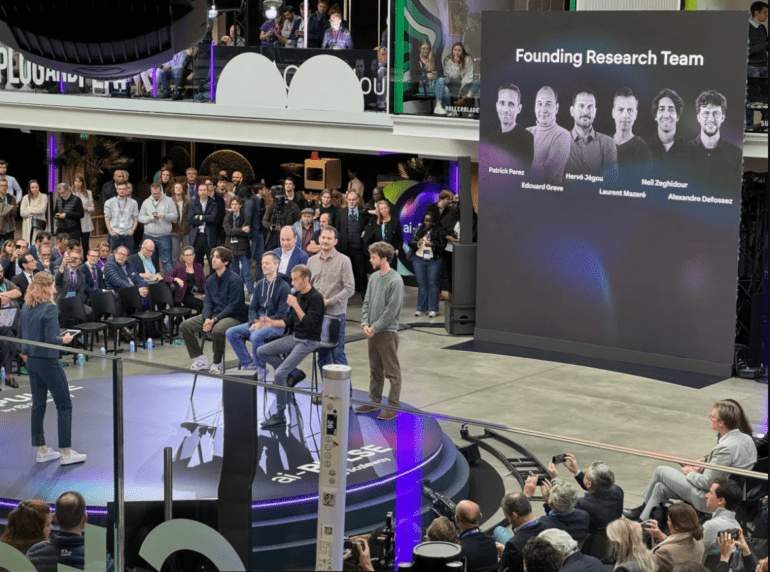TL;DR:
- Kyutai, a French AI research lab, boasts a significant budget of $330 million.
- Spearheaded by Iliad CEO Xavier Niel, Kyutai is dedicated to advancing artificial general intelligence.
- It collaborates with PhD students, postdocs, and researchers on research papers and open source projects.
- The initial €100 million commitment has grown to nearly €300 million, thanks to contributions from prominent backers.
- Scaleway provides Kyutai with a thousand Nvidia H100 GPUs for its computational needs.
- A distinguished team of scientific advisors, including Yejin Choi, Yann LeCun, and Bernhard Schölkopf, supports Kyutai.
- Kyutai prioritizes scientific transparency, emphasizing the publication of research findings.
- It differentiates itself by practicing open science, sharing not only open source models but also training source code and data.
- While not aiming for rapid development, Kyutai expects to contribute significantly within a year.
- The emergence of Kyutai raises questions about research labs’ efficiency in releasing foundational AI models compared to private companies.
- French President Emmanuel Macron advocates regulating AI use cases rather than model makers to ensure innovation.
- Xavier Niel aligns with Macron’s stance, emphasizing the importance of prioritizing innovation over stringent regulations.
Main AI News:
In the realm of artificial intelligence, Paris-based Kyutai is making waves with its formidable $330 million budget. This privately funded nonprofit, spearheaded by French billionaire and Iliad CEO Xavier Niel, is dedicated to advancing the frontiers of artificial general intelligence. It’s a beacon of collaboration, enlisting the talents of PhD students, postdocs, and seasoned researchers who will collaborate on pioneering research papers and open-source projects.
Initially, Iliad pledged €100 million (approximately $109 million) to fuel Kyutai’s ambitious mission. However, thanks to the support of influential backers, including fellow French billionaire Rodolphe Saadé, CEO of CMA CGM, the financing for this groundbreaking initiative has skyrocketed, nearing a remarkable €300 million. Notably, Saadé’s contribution matches that of Niel, further underlining the significance of Kyutai’s vision. Additional funding from Eric Schmidt’s foundation and undisclosed benefactors only adds to the impressive financial backing.
Yet, this is only the beginning. Kyutai remains open to further contributions and is keen to attract interest from potential investors. “What’s intriguing, with so many journalists in attendance, is that the project could potentially capture the attention of more investors,” Saadé remarked during a post-announcement press conference.
As Kyutai delves into foundational AI models, it’s imperative to have the computational firepower to match its ambitions. Fortunately, Scaleway, the cloud division of Iliad, recently acquired a substantial arsenal of a thousand Nvidia H100 GPUs. These state-of-the-art GPUs are indispensable for both inference and model training, and they will be made available to Kyutai at cost, facilitating the lab’s cutting-edge research.
Kyutai is already assembling a formidable scientific team, with six distinguished individuals taking the stage to outline their past achievements and future objectives. Patrick Perez, formerly of Valeo, has been appointed as the lab’s director. Furthermore, Kyutai has enlisted a panel of renowned AI researchers as scientific advisors, including Yejin Choi, Yann LeCun, and Bernhard Schölkopf, who will provide periodic feedback and guidance.
One compelling reason for researchers to join Kyutai is the opportunity to publish their research findings. In an era when major tech companies are becoming less receptive to scientific publications, Kyutai stands as a beacon of openness and collaboration, committed to advancing research and contributing to the greater good.
While Kyutai enters the scene as an open AI research lab, it’s not alone in its quest. Other entities, like Meta with its Llama model and Mistral AI, have also ventured into open-source foundational models. Kyutai, however, distinguishes itself by embracing open science principles, not only releasing open source models but also sharing the training source code and data that elucidate the development process.
Regarding the timeline, Kyutai acknowledges that its journey may not be a race to the finish line, as the lab prioritizes scientific understanding and transparency. Nonetheless, the team anticipates having valuable contributions to share within a year, reflecting their dedication to fostering a collaborative research ecosystem.
Mazaré, a member of Kyutai’s team, applauds Mistral AI’s success in fostering community engagement around its open-source model, highlighting the potential for collective innovation and application of foundational models.
The emergence of Kyutai also raises intriguing questions about the efficiency of research labs compared to private companies in releasing foundational models. Moreover, it piques curiosity about how private enterprises will leverage Kyutai’s work for commercial applications, potentially reshaping the AI landscape.
French President Emmanuel Macron, in a prerecorded video message, underlines France’s commitment to regulating AI use cases rather than model makers, a stance reflected in Europe’s AI Act negotiations. Macron emphasizes that regulation serves to safeguard citizens, economic players, and democracy, rather than stifling innovation.
Niel aligns himself with France’s stance on regulation, believing that it is essential to prioritize innovation over stringent regulations in the current AI landscape. He asserts that excessive regulation could impede the progress of European newcomers and hinder their ability to compete globally.
As Kyutai and the broader French AI ecosystem gain momentum, the prospect of “French imperialism in AI” becomes a tantalizing vision of the future, as Niel playfully envisions a time when French AI companies could dominate the global landscape.
Conclusion:
Kyutai’s formidable financial backing, commitment to open science, and collaboration with esteemed researchers position it as a transformative force in the AI landscape. As it advances the frontiers of artificial general intelligence, the market can expect a resurgence of open-source AI innovation, potentially redefining the competitive dynamics and fostering a global ecosystem of AI research and application.

